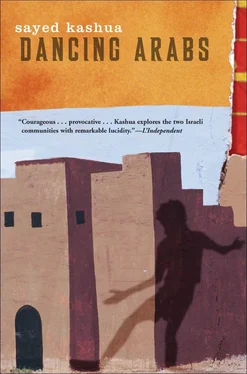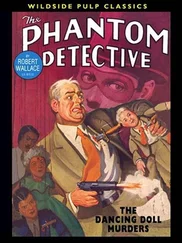My hands froze. It was a picture of my father. True, he looked much younger. I’d never seen a picture of him at that age, but I could swear it was my father.
I lifted the paper, and underneath it were many more newspapers using that old passport photo. All of them were in Hebrew, and in class we were still plodding through “Who is this? This is Father. Who is this? This is Mother.” I made up my mind: I’ve got to learn Hebrew. I’ve got to be able to read a Hebrew newspaper .
I rummaged some more and found dozens of postcards hidden underneath. These were in Arabic. I recognized my father’s handwriting right away: beautiful and rounded, like a drawing. My father had been the best student in Tira. I’d always wanted to be like him.
I pulled out a postcard and read:
Dear Bashir,
How is my sister Fahten? I hope everything is well with you. I am fine, thank goodness. Tell Mother to stop crying. I will be released soon. Give my love to Sharifa, Fahten, Ibtissam, Shuruk, and the children.
P.S. There are a few things I would like Mother to bring on her next visit: a notebook, two pencils, a pair of socks, and two pair of underpants.
Yours,
Your brother Darwish
There were many red triangles on the postcard, with some Hebrew writing inside them, and on the back was a black-and-white picture of a girl soldier eating a falafel. Another bell went off. They were breaking for recess, and class would be starting again soon.
I quickly arranged the postcards and the papers the way they were before, put all the equipment back in the suitcase, and placed the suitcase back on the top shelf. After locking the cupboard, I pushed the key into the hidden pocket, and within two minutes I had returned the chair to the kitchen, put my shoes on, locked the front door, and was running back to class.
On my way, I saw a funeral. I spotted my grandmother. It was Abu Ziad who had died, our neighbor, whose grandson Ibrahim was in my class. My grandmother couldn’t stand the sight of Abu Ziad. As for me, I couldn’t stand the sight of Ibrahim.
The Best-looking, the Smartest
One day when my father was a young man, he was sitting on the bed and listening to the radio.
“I don’t know what he was listening to,” Grandma says, “but all of a sudden he gave out a Yes! and jumped to the ceiling. Where did he take the strength from? He literally flew through the air. It gave me a fright, and I said, ‘In the name of Allah the Merciful, what happened to you, yamma ?’”
My father didn’t answer. Grandma says he had a smile on his face, the likes of which she’d never seen before, and he packed a bag at once, kissed her, and said he was returning to Jerusalem.
A few hours later, the A-Daula — the State — arrived at our door. There must have been a hundred soldiers and policemen. Grandma was alone in the house. My four aunts were married already. “They searched every corner of the house. They had instruments that beeped, and they ran them over every stone. They turned the cupboards upside down, and the beds too. I said to them, ‘Tell me what you’re looking for, and maybe I can help you,’ but they didn’t answer. They went through every page in your father’s books, took some of them, and left others behind. They went through his papers too. Then they started on the garden, digging up every inch.” They’d been searching for weapons, of course, but she didn’t figure that out until after they’d left. “I knew something had happened to him. I begged them to tell me if my son was all right, to tell me what had happened, but they didn’t answer.”
Grandma says my father never gave her so much as a single moment of peace. Ever. Grandma loves him very much. She says she loves him more than she loves herself. She was so keen for him to study at the university, she did everything she could to get him the tuition, the rent, and the spending money. She worked like two men, and everything she earned was for him. He lacked for nothing. Nobody would have guessed he was fatherless. He was the cleanest child in the class, the best-looking in the school. His clothes were always neat and ironed.
My grandma says he would go to school like a prince. Everyone envied him. Lots of kids beat up on him, and Grandma would head straight for their homes and shout at them and their parents. Anyone who tried to pull anything with my father knew he’d have my grandma to answer to. He was the best student. He studied a lot. Every night he’d sit up and study by candlelight, and when our neighbor would start singing — she loved to do that right in the middle of the night — he would light the kerosene heater so the noise would drown out her voice. He paced the fields with his books in hand and got the highest grades.
On graduation day my Uncle Bashir, Allah yerakhamu, waited for him at the gate, and as soon as the ceremony was over he lifted my father up high, seated him on his shoulders, and danced all the way home. Uncle Bashir was a hero. He was broad as a camel. Barely made it through the door.
You couldn’t tell that my father had no brothers and no father to take care of him. Even when she had no money for food, Grandma would buy him any book he asked for. She also bought him an expensive bike. She didn’t want anyone thinking she was poor. She’d always tell me how she used to stuff plastic bags into the quilts, so her neighbors would think there was money rustling inside. No one could figure out how a widow who worked as a fruit picker could have money, but she just always said, God provides.
And then everything came tumbling down around her: her son, her investment, his studies. Even Grandma didn’t know where he was. They said he was with the army. She couldn’t sleep till she saw him. Uncle Bashir and Uncle Shakker — Aunt Ibtissam’s husband — helped her comb every prison in the country. They didn’t have a car, so they had to take buses. First they were told he was in Maskubieh, then in Ramla, then in Shatta, in Damon, in Beersheba.
Only two weeks later did she see him being taken to the detention center. She says she cried and screamed. He seemed smaller than usual, and he looked hungry. She always used the same words to describe what had happened there, and she’d always hold her white handkerchief in her hand, lifting it and lowering it at a mourner’s pace, as if she’d filled it with sand and was pouring the sand over her head. “They’re killing you, yamma. Did they beat you? What have they done to you, yamma, ya habibi ?”
Grandma says that was just the beginning. She didn’t have money for bus fare, so she started borrowing from my aunts to make the weekly trip, every Friday. She didn’t miss a single visit, and she went for every remand. She didn’t understand what they were saying. She just wanted to see him again, to know he was all right. She would never forgive herself if she missed even a single opportunity to see him. And she never went empty-handed. Always took him something to eat or something to wear, so he wouldn’t get the idea that she was lacking for anything.
Her legs grew weaker. Her joints turned to soap, and she began using a cane. My father had been remanded yet again, without any evidence being produced. It was the Shabak, the General Security Service, that had demanded those remands, and the material was classified. All they said was “Dangerous, dangerous.” It’s known as administrative detention. They took him to a different detention center each time and never bothered to let Grandma know. She would have to go to great lengths to find out he’d been transferred, for example, from Shatta prison to Damon prison.
She learned the ropes in no time. She developed ties with Arab members of the Knesset, the ones people referred to as Druze dignitaries and Arab dignitaries. She wrote to all the newspapers. Every week she’d send out letters to all of them, written for her by people in the village who had a nice handwriting. She dictated: Give me my son back. I have nothing in the world except him. You’re killing me. Sometimes one of her letters appeared in print. She kept all of them in the blue suitcase. She’d go to different villages in the Galilee and meet with anyone she thought could help: mayors, mukhtars, Druze clergymen. Time and time again, she’d visit them. She’d make them write letters to judges, to the police, to the government. “All he did was go to study,” she’d explain to them. “They’re just jealous. Those goddamn bastards informed on him, because he’s the best-looking, the smartest.”
Читать дальше












